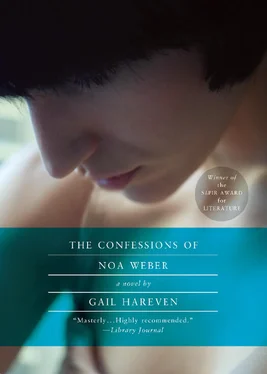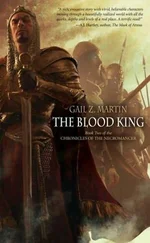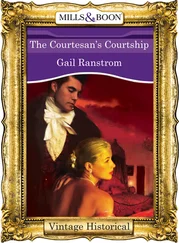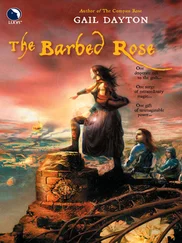When she came to me she already knew that Alek had left—“that one of yours with the eyelashes” she called him — and when she placed the plate whose steam made my face damp before me I somehow understood that she was offering me her biography on a steaming plate as well. That she was laying her past before me not only as “a personal example of willpower and character,” but mainly in order to make this spoiled young girl open her mouth at last and give her a clue as to her situation.
When Miriam’s husband went off with his teenage mistress and with Miriam’s gold bracelets, she had nobody to lean on: her father was already sick when they arrived in the country, her mother had three more young children at home, and in comparison to these facts I know that my unhappiness was like a pampered parody of distress.
A pampered parody of distress — that’s what I was then, and that in many ways is what I still am today. And then, too, when she asked me straight out over a cup of tea where my family was — Wasn’t that your father who hooted for you downstairs then, driving the whole street mad? — I knew how ridiculous I was in the comparison between us: she a penniless immigrant, and I the daughter of parents who may not have been rich, but who were getting richer all the time, and who had never lacked for connections or the sense that the country belonged to them.
I have no idea whether Miriam loved her man before he ran away, or how she loved him, I never dared to ask. History as she tells it begins on the day he deserted her, and from the beginning of this history he is referred to in derogatory terms. Perhaps she called him different names once, and perhaps not, but in any case it was clear that she would not be sympathetic to the kind of reckless madness that led “that poor girl” to run away with her husband.
“You could make a movie out of my life,” she sometimes says, with absolute justice. If I had to choose a heroine, I would definitely choose her, myself I don’t even see as a candidate, but if that’s what I think, and I really do think so, then how is it that to this day I still feel that I have a certain advantage over her? Not because I am better educated, not because I know more words, but only because in my folly love makes me superior in my own eyes. As if it has exalted me to some lofty pinnacle, as if I have been branded by a hallucinatory fire, and as if I have been privileged to touch what she and others have not touched.
Miriam Marie loves her son, her daughter-in-law, her grandchildren, two of her brothers and most of her nephews and nieces. She loves most of the toddlers in her nursery school, and some of their mothers. And to my good fortune, I don’t know why, she loves me too and she loves Hagar. When Miriam says that someone loves, she almost always adds proofs to her statement; practical proofs, not cliches about feelings: “You should see how he helps her,” “the way he looked after her,” “he would do anything for her.” “His heart goes out to her,” or “her heart goes out to him” are phrases which do not appear in her lexicon, and certainly not “soul mates combining into one androgynous creature.” In all the years that we have known each other, I have never heard any such highfalutin drivel from her.
Miriam is occupied with real people: the asthmatic Itamar, Dror who is about to be drafted, Yaron and Liron who are building a house; whereas I am occupied with the fictions of my books, and with my ever-present absentee. And from this point of view as well I believe that she is superior to me.
But what do I really know about her fantasies and her nights? I know nothing, and I have no right to patronize her in this way.
After I had given her a few mumbled details about my situation, she pronounced that I had to “forget everything that had happened” and turn to my parents, because “what do quarrels mean now? This sweet little baby is their granddaughter, wait and see what they say after they see her.” I promised her that I would think about it, and I realized that she wouldn’t leave me be, and she didn’t, even after my parents showed up.
PARENTS
My parents showed up the next day. Without thinking about it I had given my name as Weber in the hospital, and one of the nurses who knew my mother made the connection and got in touch with her. I have already said that my parents know everybody and everybody knows them, and it was only to be expected that they would hear the news, sooner rather than later. I think that they had prepared themselves for it, for as they told me afterwards with a reasonable degree of resentment, when the nurse phoned my mother was able to hide her ignorance of the fact that she was a grandmother from her. She didn’t repeat the text to me word for word, but I can imagine it: “Our Noa … she’s so stubborn … got it into her head that she didn’t want any visitors … you know how it is, it’s so important to them to be independent … she feels fine … everything’s fine … the difficulties are behind us … we’re looking to the future.”
I could easily write the memory of their appearance at my door as a “shtick,” and to tell the truth I actually did so a number of times over the course of the years: little Talush, a scouting party of one little girl, is sent to knock on my door. My mother takes up her position as backup halfway down the stairs. My father sits in the getaway car without switching off the engine.
When it transpired that the “Russian nihilist,” as Grandma Dora called him, was gone, the family gathered round me, and in a matter of minutes, without any overt negotiations, formulated an agreed version of the state of affairs. Our Noa came under a bad influence, our Noa was kidnapped by the wicked wolf, and now that the wicked wolf is gone, the past is forgotten and we’re “looking ahead to the future.” My father, who apart from the embarrassments I’d caused resented the scene in the street, found it a little difficult to accept this agreement, but from the moment the Weber team made it into the apartment, and from the moment it transpired that Noa Weber looked the way she looked — in other words, a mess — it was clear that Mother Batya would take command. Armed with my new cunning of the mad I was relieved at not having to answer any questions about “that man,” that I was not being required to pay with a confession, and weak as I was I surrendered myself to their efficient care. Because at that stage I really did feel sick. Sick and very frightened.
My mother was at her best, performing her role as a nurse, and although her experience with babies was not great, she applied herself fearlessly to the operations of bathing and diapering. Methods of suckling, pacifiers for and against, and ointments for diaper rash supplied us with sufficient subjects of conversation, and the rest of the time we dealt with my “recovery”—of my body, that is. I was a good patient, just as my mother was an excellent nurse. Lying between clean bedclothes, my shampooed hair on the raised pillow, my hands on the blanket, I did whatever I was told. When I was told to eat, I ate. When I was told to drink juice, I drank juice. When I was led to the bathroom, I washed myself. Days and nights ran into each other, and my memory from then is mainly of a sensation of dripping; drops of milk and blood and tears that didn’t stop flowing from the moment they started taking care of me. Dripping into the shower water. Dripping into the steam of the soup.
The tears were genuine, I didn’t have the strength to stop them, but at the fringes of consciousness I was also aware of the fact that crying helped me. The child is weak and traumatized. Leave the child alone. Don’t remind her, don’t ask any questions. Can’t you see that she’s suffering enough as it is?
Читать дальше












